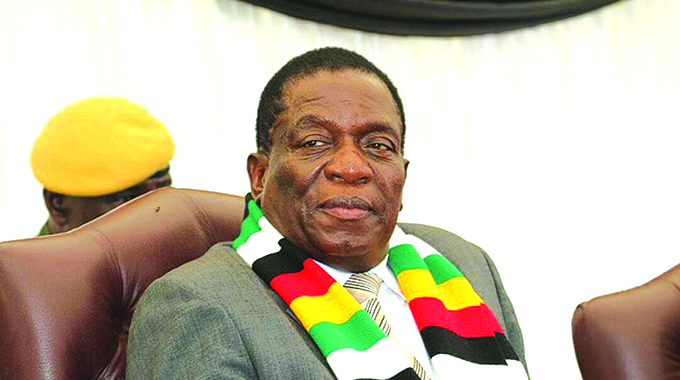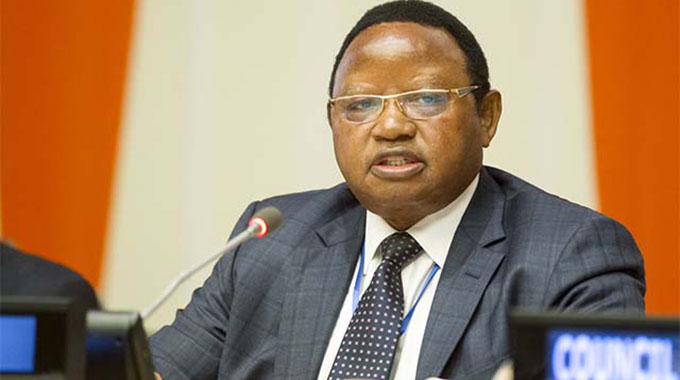President defying hunger, odds

Fungi Kwaramba Political Editor
AS the world grapples with hunger spawned by the Covid-19 pandemic and most recently geopolitical shifts due to the Russian/Ukraine conflict, Zimbabwe finds itself in an enviable position as it is pursuing policies that will ensure food sufficiency and security and the eventual elimination of dependency on donor aid which often comes with strings attached.
At the forefront of the new path that Zimbabwe is following is President Mnangagwa who has introduced a cocktail of policies such as Pfumvudza, and the Presidential input schemes in growing key crops like wheat and maize, both of which are staple diets in the country.
For instance, this year Zimbabwe will have, for the time in history, enough wheat to last for 13 months, thanks to dams that are being built by President Mnangagwa across the country as part of drought-proofing the critical sector that is the mainstay of the country’s economy.
This will ensure that the country will be insulated from global shocks such as the Russian/Ukraine conflict which has driven prices of basics upwards, as fuel prices go up due to blockages and other bottlenecks caused by geopolitical shifts.
As part of climate-proofing the agriculture sector the Second Republic has set aside a whopping US$1.2 billion for the construction of 12 high-impact dams — which are in various stages of completion and will ensure that the country achieves its target of a US$8.2 billion agriculture industry by 2023.
Spread across the country’s 10 provinces, the dams — some of which have been completed like Muchekeranwa in Mashonaland East and Marovanyathi in BUhera — will provide water both for domestic use and irrigation.
Apart from irrigation, numbers under the ubiquitous Pfumvudza/Intwasa Programme have morphed from 1.8 million to 3 million households, a scenario that will ensure that in the long run Zimbabweans will not be at the mercy of donors, who often dangle their donations with strings attached.
While addressing multitudes at the National Heroes Acre, the President impressed on the importance of ensuring food security and saluted new heroes who have emerged in the agriculture sector who are working hard to ensure that the country’s silos are filled up.
“The broad array of programmes by my Government to enhance production and productivity in the agriculture sector is seeing the emergence of new categories of heroes and heroines in this sphere.
“The Pfumvudza/Intwasa Programme will not stop and remains ongoing with the number of beneficiaries increasing from 1.8 million to 3 million households.”
The President implored Zimbabweans to strive for food sufficiency to guarantee national dignity as an independent people inspired by the resilient spirit of yesteryear heroes.
“No Zimbabwean should be subjected to abuse and ridicule by subversive NGOs on the pretext of food aid,” he said.
The National Heroes Day, said President Mnangagwa, reminds Zimbabweans that its people are not ordinary, and neither is the nation.
“Our collective ancestry has ingrained in us the resilient and warrior spirit of our forebearers, who were ingenious innovators, builders, explorers, enterprising traders and yes, gallant fighters,” he said.
Indian scholar and food sovereignty advocate Dr Vandana Shiva recently observed that hunger is now often in developing countries — which ironically are agricultural communities.
The reason for the hunger she said is that people are growing crops for sale to recover costs incurred during production.
“If the world has to be fed it has to be fed by growing food locally to be used locally as the biggest proportion of the food basket, some elements will be traded internationally but what is traded internationally should not be staple foods.”
She said the world should not be turned into a world of staples as that has little to do with feeding the world but controlling food supply chains.
Her statements dovetail with President Mnangagwa’s thrust that Zimbabwe should be able to feed itself using its own resources, land, water and the people, to guard against external control through the use of hunger as an instrument of war and a tool for manipulation that finds expression in and through nongovernmental organisations.
Although Zimbabwe has not been spared by weather vagaries caused by climate change, President Mnangagwa has assured the nation that the country has enough stock to feed everyone in need.
Going forward, the Second Republic has started distributing inputs for this year agricultural season, as Government targets to produce 3 million tonnes of maize during the 2022/23 summer cropping season
The country requires 2,2 million tonnes of maize for human and livestock consumption; therefore, the target will position Zimbabwe as a significant player in grain production in the region.
Under President Mnangagwa’s watch at least 2,7 million communal households will benefit from 35 000 two-wheel tractors replacing the traditional hoe and plough system in a transformative move by Government set to change lives and livelihoods across the country.
Further, 5 000 field schools, and 4 000 livestock and veterinary schools meant for agricultural development have been established countrywide as the country implements wholesale changes designed to steer the agricultural sector towards becoming a US$8.2 billion industry by 2025.
The battery of measures that have been brought by President Mnangagwa will also see 400 000 peri-urban farmers benefiting from the Presidential Input Scheme, as part of development that leaves no one and no place behind.
This is also part of implementing the National Development Strategy 1 (NDS1) which places particular emphasis on agricultural mechanisation and modernisation.
The transition to the two-wheel tractors is set to benefit millions across the country and comes in handy, especially as some farmers lost their livestock to diseases.
Apart from targeting small-scale farmers, commercial farmers will also benefit as 3 000 tractors are expected in the country, in measures that are aimed to ensure food security, save foreign currency from grain imports, and reposition Zimbabwe as a major agricultural products supplier in the world.







Comments